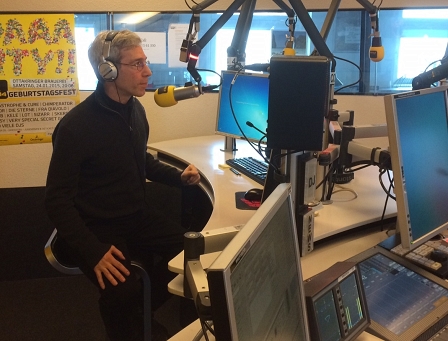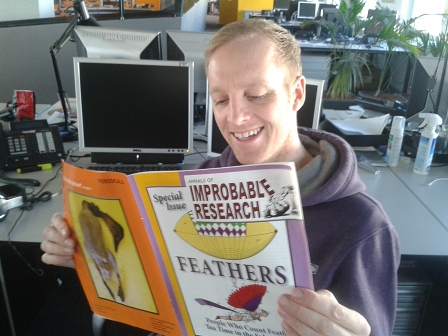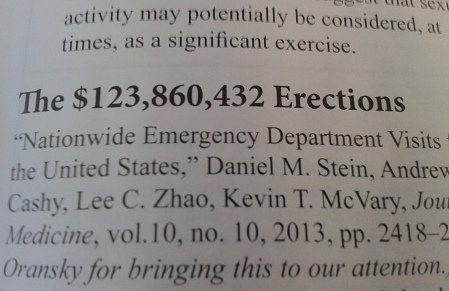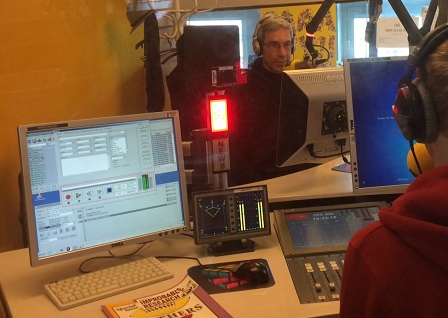Erstellt am: 31. 1. 2015 - 12:16 Uhr
"Science Is One Big Soap Opera"
Listen
FM4 Reality Check, Saturday, Jan. 31th, 12:00-13:00
... und anschließend 7 Tage on demand.
"In science you know every day that you'll fail many times," says Marc Abrahams, "so it helps to have a sense of humour".
Marc is the founder and editor of the cult magazine "Annals of Improbable Research" and the man who, back in 1991, launched the Ig Nobel Prizes – an award celebrating science that manages to "first make people laugh, and then make them think".

Oliver Lehmann
Abrahams is in Vienna for the first ever Wissenschaftsball, a party aimed at denouncing "political radicalism" and deliberately held a day after the controversial Akademikerball so as to symbolically reclaim academia in the name of tolerance and open-mindedness. He says he is not interested in being judgemental, but in encouraging dialogue and debate through the powerful means of laughter.
Over its 25 years, the IG Novel committee has rewarded research into a "gay bomb" that makes enemy troops "sexually irresistible", has given an award to the enterprising team who researched the way reindeer react to seeing humans disguised as polar bears, has celebrated the scientists who delved into the brains of people who see the face of Jesus in a piece of toast, and honoured the ingenious biologists who discovered that chimpanzees can recognise each other from photographs of their rear ends.
Curiosity is King
"Some of them are good, some of them are bad. That does not matter to us. This is one of the very few prizes in the world where good and bad don't matter. The science can be important or worthless. It just has to make you laugh and then think."
It is thanks to the Annals of Improbable Research and the Ig Nobel's that we know that dogs align to the north-south axis of Earth's magnetic field to urinate and defecate.
Now I challenge you to deny that that is fascinating knowledge.

Arthur Einöder
But don't be too quick to judge what is useless and what is worthless. Last year, I spoke to one of the world's leading experts on algae which is nowadays touted as a wonder bio-fuel. Her research is in hot demand, but for years she simply studied the green gunge because it fascinated her. The useless can suddenly become the very useful. Alexander Fleming changed the course of history by accidentally discovering penicillin when a window was left open in his laboratory and destroyed his samples.
You don't always know what you are looking for. In science, curiosity is king.

The Annals Of Improbable Research
If you win a Ig Nobel prize, you won't get rich. You get a handmade award and an invitation to the award ceremony at Harvard University but you have to pay your travel expenses there and back. Nonetheless, recipients are usually extremely pleased to win – they don't see it as mockery but as welcome promotion:
"We ask them secretly beforehand if they want to accept. If they decline we tell no-one about it. But they rarely decline." Winners of actual Nobel Prizes hand out the awards and the coverage helps more awardee's name and work more widely known. Often there is serious, meaningful science behind the entertaining headlines and if science journalists ask the right questions, the Ig Nobel can open doors.

Oliver Lehmann
A decade ago, for example, there was much mirth when California-based scientist Ivan Schwab won an Ig Nobel prize for examining brains of the woodpeckers to find out why it does not suffer from headaches after banging its head against a tree trunk 12.000 times a day. Schwab accepted his award in good grace and since then his research has become a vital part of the study into the consequences of head injuries associated with impact sports.
Fans of rational fact-based dialogue should be fans of science, but often it is difficult to engage people with science. Abrahams believes better science journalism could help and that science reporters should look at the way we write about sport:
"One of the most interesting things about science is the people involved. There are not lumps of rocks doing experiments. These are people working on problems. It is a constant soap opera: they are trying things and then get frustrated and someone doesn"t think they should be doing it while someone else thinks they should be doing it differently; someone's love life is blossoming and all these things are happening at the same time. If a little more of that went into the reporting of science it would become more interesting."
Anhören
Listen to the whole interview with Marc Abrahams:
Dieses Element ist nicht mehr verfügbar


